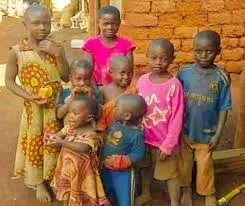Memories of manslaughter in Ngarbuh-Ntumbaw village, Ndu subdivision in the North West region of Cameroon on February 14th 2020 remain fresh in the minds of victims.
“Our children, wives, brothers and sisters, mothers and fathers were killed in the most brutal and inhuman way by the military. It still remains a miracle for those of us who escaped”. One of the victims we named Stephen — for fear of reprisals, told Mimi Mefo Info.
Though Stephen’s brother was among those killed, the 58-year-old man has opted not to seek justice in court. “The courts are owned by the government. The military that killed our relatives is owned by the government. So how do you expect me to go to court? I place everything that happened in the hands of God. He should judge all those that killed and destroyed Ngarbuh,” he told Mimi Mefo Info with a deep voice of grieve and agony.
According to Barrister Gbaka Ernest, one of the lawyers defending victi of the Ngarbuh massacre, the issue of victims shying from court is really prominent in the case. “Many victims of Ngarbuh massacre went into hiding after the incident. At the moment, we have just two or three victims that are ready to testify against those who committed the killings in court. We as lawyers have the impression that there is fear,” said Barrister Gbaka.
While some Cameroonians point accusing fingers at the military for possibly hindering victims from testifying in court, Gbaka holds a contrary opinion. “One of the victims that came to court returned to Ngarbuh village and was intimidated by some Fulanis. The victim explained to us that he was working on the farm when some Fulanis came and intimidated and threatened to kill him. This should be one of the reasons why many are afraid to talk in court,” he noted.
With nearly thirty people killed in the military raid, report of an independent investigation commission published months after stated that military men alongside some Fulanis acting in the name of vigilante group members invaded Ngarbuh village on the night of February 14th killing and setting houses on fire.
Questioned if Government’s payment of compensation can influence the judicial process, the defence Team confessed they have no right to comment on that. “As lawyers, we follow what the civil claimants say concerning the case. If they feel government’s compensation is enough to withdraw the case, then fine. If not we continue.”
The court has summoned the victims and the next hearing is expected on February 18th 2021.
As the government of Cameroon compensates the victims of the massacre to assist them to resettle in the village, some are not interested in the package. One of is Amadou Ngenge. “My brother is still missing one year after the killings. I searched for all the bodies and could not see him. I don’t know if he is alive or dead. My worry now is to find my brother not to return and settle in Ngarbuh,” Amadou said, adding that he is still mourning the death of his brother.
Amadou attests that he has not declared the issue of his missing brother to any competent authority. “I am afraid that if I notify authorities, I will be tagged a Separatist and may be arrested and later killed. My prayer to God is to see my brother one day,” he retorted.
One year after the incident, government’s move to compensate victims have been criticized by some people who think designing a lasting solution to end the war should be a priority. They argue that the government has failed to take concrete steps after the incident to stop manslaughter in the restive North West and South West regions — plunged into an armed conflict for five years.
Mbatho Ntan.



